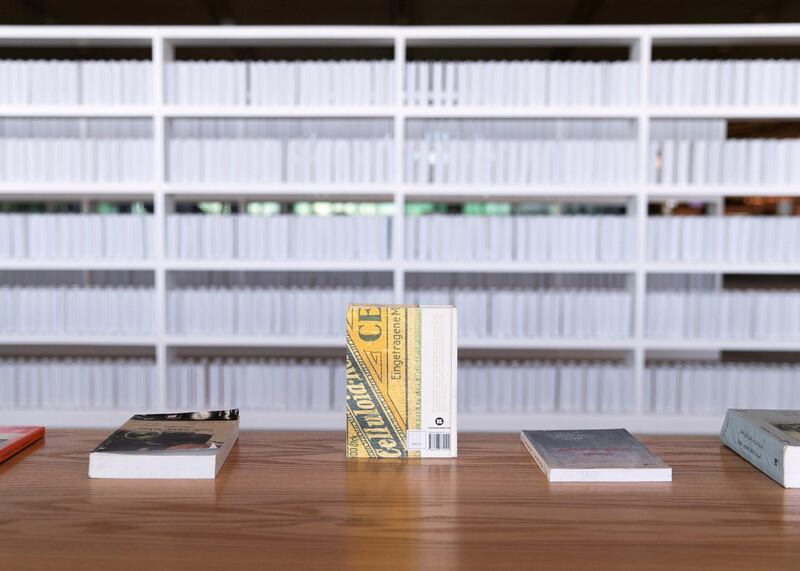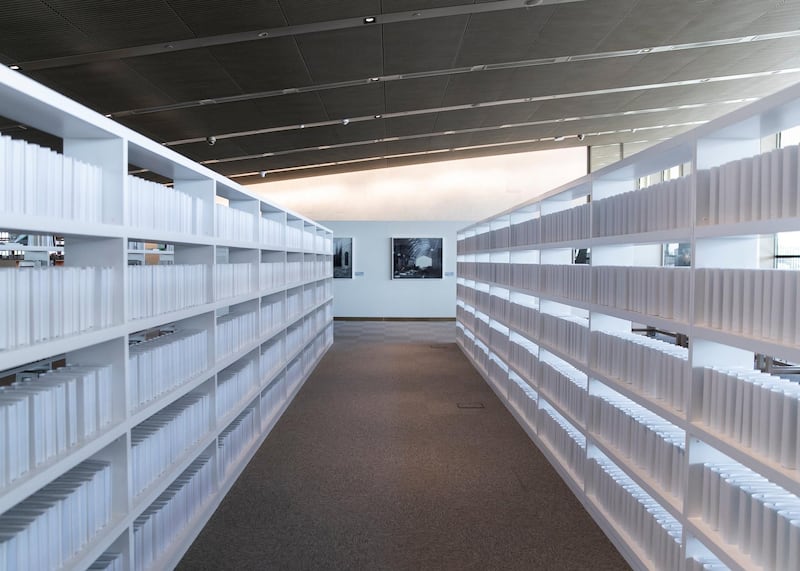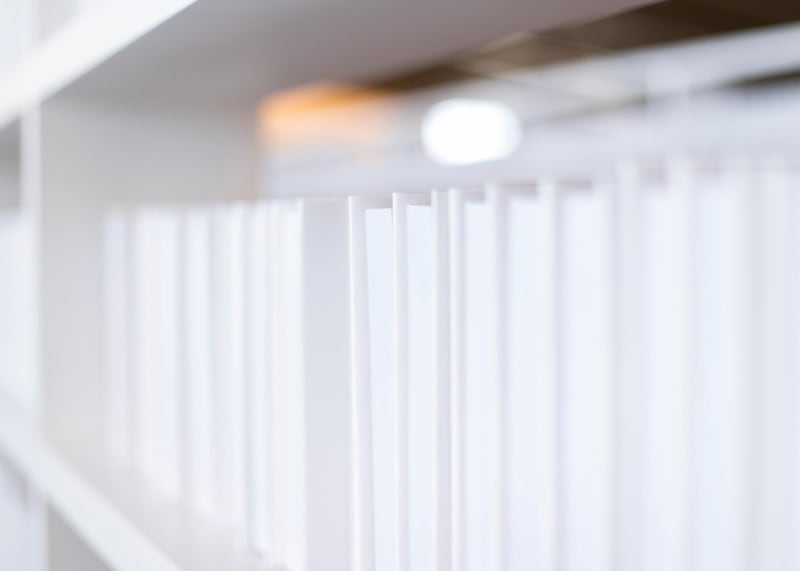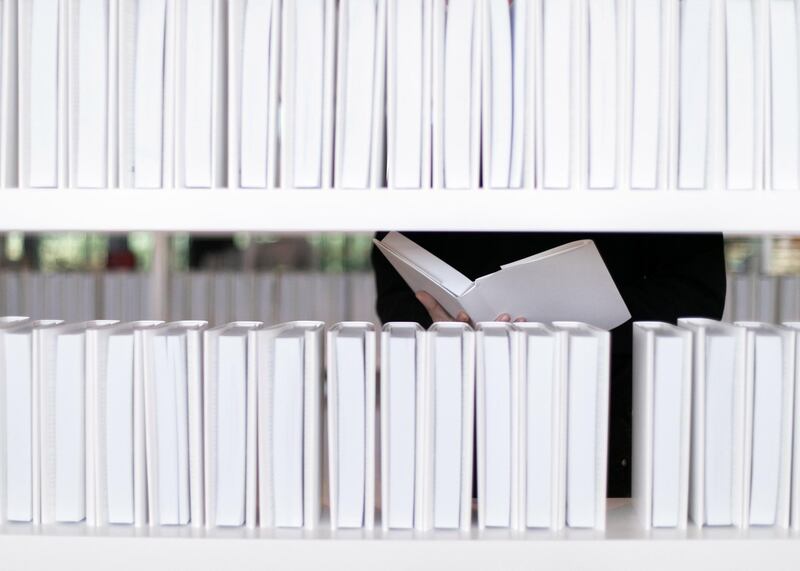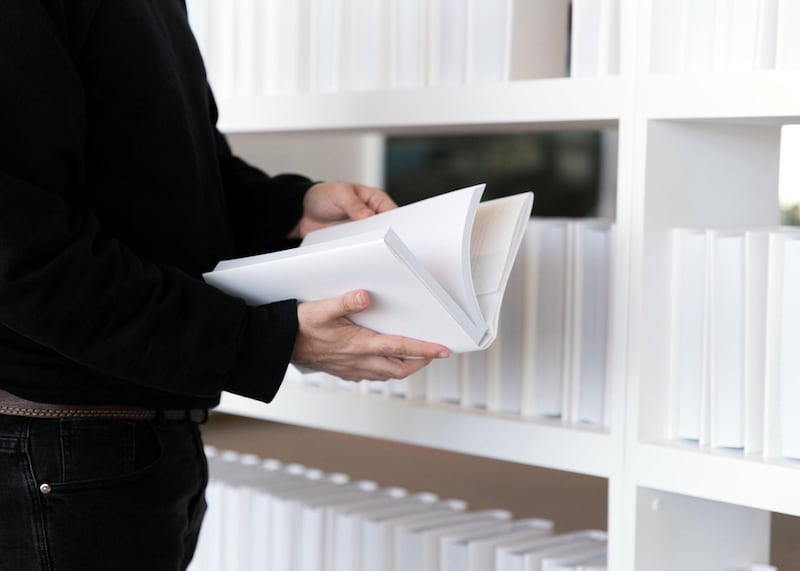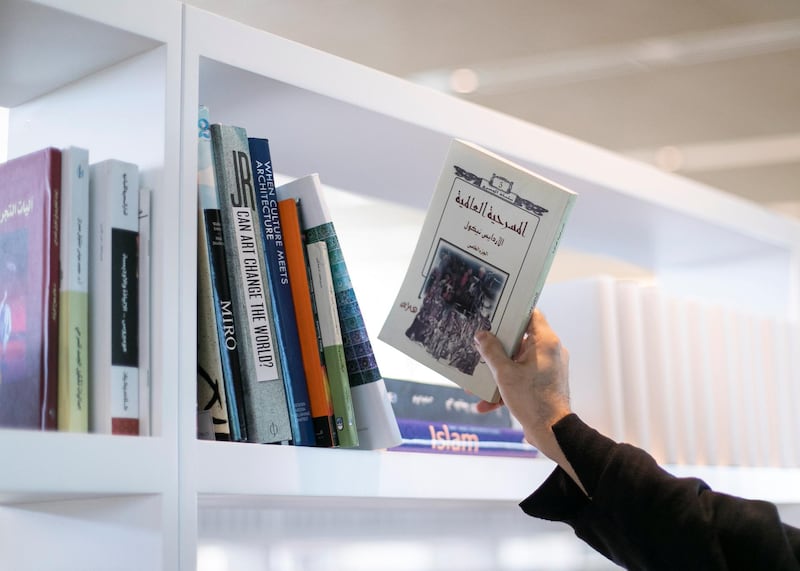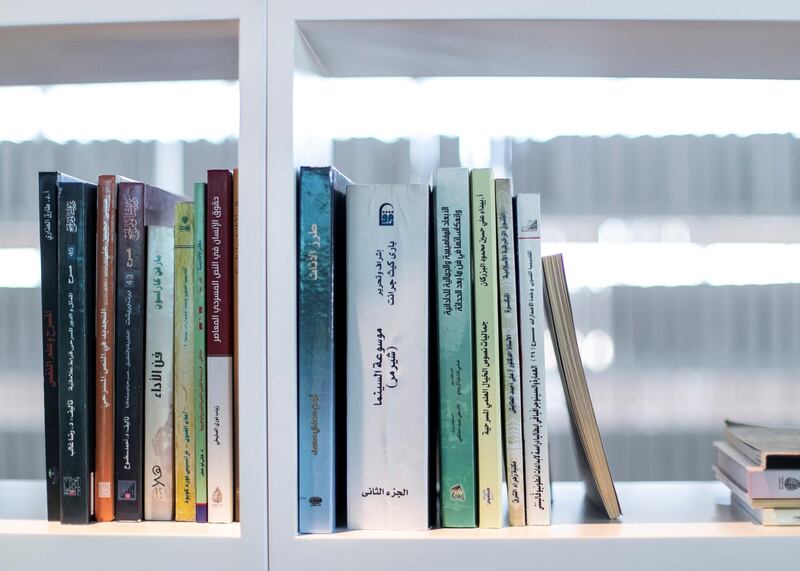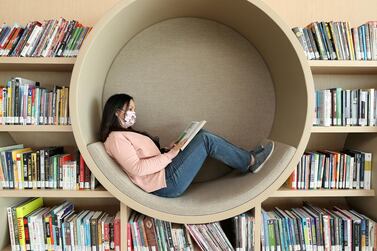On the sunlit upper floor of Sharjah’s House of Wisdom, in the cultural centre’s exhibition space, more than 3,000 books line three bookcases.
Their pages are blank. Hardcovers plain and fitted with matching flour-white sleeves. There are no distinguishing marks on their spines save for the number 168:01 printed at the bottom in a ghostly silver.
The books are tragic in their blankness, seemingly sapped of the connotations with which the medium has long been associated. No longer do they facilitate a motionless travel. They don't make up a Borgesian paradise. Neither do they serve as mirrors, showing what is already inside of us.
Do you know the true power of books? The weight they hold in culture and history? ⠀
— House Of Wisdom (@sharjahHOW) January 3, 2021
⠀
Wafaa Bilal may have the answers... Stay tuned.⠀
⠀#UAE #Sharjah #Shj #HouseOfWisdom #Knowledge #WafaaBilal pic.twitter.com/xxkALJ1TFp
However, there is more to them than meets the eye. The blank books make up the exhibition 168:01, an initiative by Iraqi-American artist Wafaa Bilal to restock the lost libraries of Iraqi universities and institutions, most of which were left devastated in the wake of the 2003 US invasion of Iraq.
The exhibition title, however, comes from another devastating passage in Baghdad's history: the Mongol siege of the city in 1258. The invaders committed several atrocities during the attack, in which tens of thousands of people were killed. Mosques, libraries, hospitals and palaces were looted and destroyed.
The attack was a fatal blow to the Abbasid Caliphate, which had ruled the region since 750, and marked the end of the Islamic Golden Age.
"Legend has it that during the Mongol siege, the invaders threw the book collection of the Bayt al-Hikma [Baghdad's House of Wisdom] into the Tigris. The river ran black with ink for seven days as the water washed the letters from the pages," Bilal tells The National. The first half of the exhibition's title, he says, is a reference to the seven days – or 168 hours – the books spent in the water.
Bilal, who is an associate professor at the Tisch School of the Arts at New York University, notes that the legend is contested by scholars and seen as an attempt to portray Mongols as people with little intelligence or interest in knowledge. Still, the artist saw within the story a symbolic opportunity to address a much more contemporary issue: the lack of resources available to university students in the Iraqi capital.
“The College of Fine Arts at the University of Baghdad lost its entire library during the 2003 US invasion of Iraq,” Bilal says. “Due to looters who set fire to the collection, approximately 70,000 books were reduced to ashes. More than 17 years later, few books remain in the library for art students to read and study.
“The project 168:01 took its name from the first minute after collective grief,” he says. “The starting point of the struggle to move forward and the beginning of a cross-cultural bridge between the world and the students and teachers in Baghdad.”
The blank books, Bilal says, function as a placeholder. While the whiteness of the books represents cultural loss, it is also an invitation to visitors to help revive that loss.
“Thus, the white book becomes a vehicle of change,” Bilal says. “Participants are encouraged to donate a book from a table in the exhibition and place it on the shelf in exchange for a white book. The white book is a memento of the attendee’s participation in the exhibition.”
The books meant to be donated are titles requested by university students in Iraq, covering a number of subjects from art history to theatre to world literature. They are available for purchase at the exhibition space itself and range from Dh20 to Dh250.
In the House of Wisdom, you'll find art in every corner, from the countless pages of books to the many unique events it hosts.⠀
— House Of Wisdom (@sharjahHOW) December 29, 2020
⠀
Mtsk3on wandering everywhere, and here they've stumbled on something special...Take a look!#UAE #Sharjah #Shj #HouseOfWisdom #Knowledge #Culture pic.twitter.com/xzJIGWahGs
The initiative aims to replace all 3,000 blank books with the titles. Once the exhibition wraps up on Sunday, March 21, the donated books will be shipped to the University of Baghdad, the University of Mosul, the University of Babylon and the National Museum of Iraq to facilitate the process of rebuilding.
“I consider 168:01 my first project that reflects on post-conflict practices,” Bilal says. “The project is highlighting the monumental task of grappling with the complexities of cultural destruction and rebuilding. The work addresses the future of Iraq and when someone donates a book it opens a window for knowledge and hope to a young Iraqi.”
His Highness, the Ruler of Sharjah, inspects the facilities and laboratories designed for #HouseOfWisdom visitors, as His Highness got acquainted with the Espresso Book Machine which prints and binds books on-demand in minutes.⠀ pic.twitter.com/LgrhJM5wlP
— House Of Wisdom (@sharjahHOW) December 10, 2020
This is the first time the travelling exhibition, which has also been held at the Aga Khan Museum in Toronto and the Art Gallery of Windsor, has come to the region. It is also the inaugural exhibition at Sharjah's House of Wisdom. The cultural space opened to the public on December 10, a day after its official inauguration by Sheikh Dr Sultan bin Muhammad Al Qasimi, Ruler of Sharjah. Featuring a collection of 300,000 digital and physical books, sunlit meeting rooms and study spaces, as well as several cafes and restaurants, the 12,000-square-metre site has been described as a "library of the future".
"There is a lot of scope in what we can do with these amazing spaces," Sharjah Book Authority chairman Ahmed Al Ameri told The National after the centre's opening. "We can launch literary festivals and bring interesting guest speakers. We are already working on this so, really, watch this space."
